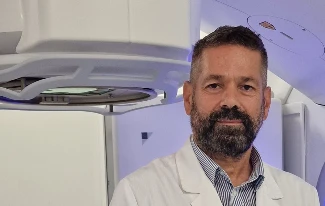3634 - Full-Body Volumetric Modulated Arc Therapy Technique for Total Body Irradiation
Presenter(s)

I. Iamundo De Cumis1, G. Fadda1, M. A. Deidda1, R. F. Farigu2, S. Piras2, D. Barrale2, I. Dessous2, E. Porceddu2, E. Soddu2, S. Atzori2, G. Arthemalle2, G. Puddinu3, S. Achena2, S. Loi2, E. Piras2, G. Caocci2, R. Mura1, and R. Barbara4; 1ARNAS BROTZU, CAGLIARI, Italy, 2ARNAS BROTZU, Cagliari, Italy, 3ARNAS BROTZU, cagliari, Italy, 4ospedale brotzu, Cagliari, Sardegna, Italy
Purpose/Objective(s): To spare organ at risk (OAR) and delivery homogenous dose using multi-isocenter volumetric arc therapy (VMAT) for Total Body Irradiation (TBI) in myeloablative and non-myeloablative conditioning regimens for allogeneic hematopoietic stem cell transplantation
Materials/Methods: Nine patients (pts) (mean age 35) were treated between August 2024 and January 2025, one for aplastic anemia (AA), one for Hodgkin's lymphoma (HL), and the others for acute lymphoblastic leukemia (LLA). Initial chemotherapy (administered based on the specific pathology) and organ function assessments were performed. For LLA pts, bone marrow biopsies and minimal residual disease evaluations were conducted. Patients were positioned on a rotatable couch (RC) for multi-isocenter VMAT simulation; the RC was used to place pts in a supine position with arms along their sides and to allow stable 180 degrees rotation from the Head-First (HF) to the Feet-First (FF) position. Computed tomography (CT) scans (5mm slices) were acquired in both HF (skull to proximal femurs) and FF (feet to L3 vertebra) positions, ensuring a wide overlap. Head and shoulder were immobilized with a 5-point mask, legs with a wedge support attached to the bed, and feet were placed in an adjustable footrest. TBI prescriptions doses were: 12Gy for myeloablative regime (2fz/day), 4Gy for AA (2fr/day), and one 2Gy (1fr/day) for HL. The body contouring was generated with dedicated software: the Planning Target Volume (PTV) of the body was created by contracting the external contour by 3mm and subtracting lungs and kidneys with a 5mm contraction
Results: VMAT plans were optimized using treatment from a planning tool, with 6-7 isocenters (head, thorax, abdomen, pelvis, femurs, knee, feet) depending on patient height: HF used 3-4 isocenters, FF used 3. The Treatment Planning System calculated VMAT with multiple isocenters in HF and FF positions, considering HF dose distribution on FF CT, enabled by CT coregistration. Intrafraction movements were verified with cone beam CT for each isocenter, and each isocenter was moved from zero CT point to avoid systematic errors. PTV coverage (for all patients) and doses at OAR for LLA patients are recorded in table. No patient experienced adverse events requiring treatment interruption. Repositioning patients during the treatment when moving from HF to FF was unnecessary due to the rotatable couch
Conclusion: The use of the rotating table made it unnecessary to reposition the patient when moving from the HF position to the FF position. Multi-isocenter VMAT with a rotating couch allowed dose modulation, OAR sparing, and a stable and reproducible setup.
| % PTV | SD | |||
| Dosimetric Parameters | PTV V100 | 87,06 | 9,46 | |
| PTV V95 | 97,75 | 1,33 | ||
| PTV V110 | 2,92 | 2,12 | ||
| MEAN LUNGS | 8,85 | 0,43 | ||
| MEAN KIDNEYS | 10,22 | 1,40 | ||
| LAT(mm) | LONG(mm) | VERT(mm) | ||
| Intrafraction Isocenters Shift | Head | 0,32 | 0,23 | 0,47 |
| Chest | 0,25 | 0,15 | 0,13 | |
| Abdomen | 0,23 | 0,22 | 0,20 | |
| Femur | 0,40 | 0,25 | 0,18 | |
| Knee | 0,30 | 0,25 | 0,30 | |
| Feet | 0,40 | 0,23 | 0,25 |
